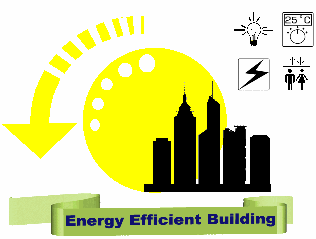
Contents
|
|
Related:
| HKU Dept of Mech Engg Dept of EEE HKU BSE |
|
|
|
|

| Level: | MSc(Eng) |
| Contact Hours: | 2.5 hours per week (One Semester) |
| Prerequisite: | None |
| Calendar Entry: | Energy terms and concepts; energy use in buildings; energy efficient building design and operation; energy efficient technologies; building energy standards and codes; building energy analysis techniques; energy auditing of buildings; economic and financial analyses. |
| Assessment Methods: | Examination (80%), Continuous Assessment (20%) |
| Course Website: | http://me.hku.hk/bse/MEBS6016/ |
| Course Co-ordinator: | Dr. Sam C. M. Hui (cmhui@hku.hk), Room 5-22, Haking Wong Bldg |
Background:
Energy performance of buildings is an important concern for building designers and owners. It has a significant influence to the quality of building design, the effectiveness of building operation and the sustainability of built environment. The study and management of energy use in buildings requires sufficient knowledge of building services systems and skills in technical and economic analysis. This course will introduce the basic concepts of building energy performance and explain the skills and practical considerations.
Educational Objectives:
- To understand the important issues associated with energy performance of buildings.
- To develop the essential skills for theoretical analysis and practical study of building energy use.
After completing the course, students will be able to:
- Describe the important issues and considerations of building energy performance.
- Explain the technologies, codes and policies for energy conservation in buildings.
- Develop the skills for theoretical analysis and practical study of building energy performance.
This course will describe, starting from fundamental principles, the important considerations for the study and analysis of energy performance of buildings. As the theories of the energy analysis are established from basic engineering principles and building environmental factors, it will be useful for the students to relate the present study to other relevant subjects in the MSc(Eng) programme.
Lectures and Assigned Readings
The teaching/learning will be supported by audio/visual aids and Web-based resources. The lectures provide the conceptual framework for the course and will be supplemented with assigned readings if necessary. Students are recommended to complete the relevant assigned readings on their own time before coming to the lecture.
Assignment
Students may be required to do assignments or exercises for this course. The purpose is to encourage you to: 1) absorb the information disseminated in class; 2) reflect on this information and consider how it may be applied in practice; and 3) articulate the outcome of these reflections in written form.
Examination
A written examination will be conducted at the end of the course. The examination marks will comprise 80 percent of the final course grade. Additional information about the examination paper will be provided over the course.
Course Website and Moodle
Updated information of the course can be found on the course website. Students are encouraged to visit and make use of the website to support their learning. They may review the lecture materials online and study the linked references when reviewing the topics. A Moodle platform has also been set up to allow internal communication and exchange.
Assessment Method:
Assessment will be based on written examination (80%) and continuous assessment (20%).
References:
There is no required textbook for this course. Some useful references and documents are listed below. Additional references and materials on the course topics will be provided over the course.
- ASHRAE, 2013. ASHRAE/IESNA Standard 90.1-2013, Energy Standard for Buildings Except Low-rise Residential Buildings, SI edition, American Society of Heating, Refrigerating and Air-Conditioning Engineers, Atlanta, Georgia. [ASHRAE Catalog: 697 A82 T4]
- ASHRAE, 2011. Procedures for Commercial Building Energy Audits, 2nd ed., American Society of Heating, Refrigerating, and Air-Conditioning Engineers, Atlanta, GA. [696 P963 A]
- ASHRAE, 2010. ASHRAE/IESNA Standard 90.1-2010, Energy Standard for Buildings Except Low-rise Residential Buildings, SI edition, American Society of Heating, Refrigerating and Air-Conditioning Engineers, Atlanta, Georgia. [ASHRAE Catalog: 697 A82 T4]
- Beggs, C., 2009. Energy: Management, Supply and Conservation, 2nd ed., Butterworth-Heinemann, Oxford. [696 B41]
- Beggs,
C., 2002. Energy: Management, Supply and
Conservation, Butterworth-Heinemann, Oxford. [696
B41][ebook
via ScienceDirect]
- Capehart, B. L., Turner, W. C. and Kennedy W. J., 2006. Guide to Energy Management, 5th ed., Fairmont Press, Lilburn, Georgia. [621.042 K35][AV 333.7 E56 F][4th ed. in ebook 621.042 C23]
- CIBSE, 2012. Energy Efficiency in Buildings: CIBSE Guide F, 3rd edition, Chartered Institution of Building Services Engineers, London. [696 E56 C4g]
- CIBSE, 2004. Energy Efficiency in Buildings: CIBSE Guide F, 2nd edition, Chartered Institution of Building Services Engineers, London. [LB 696 E56 C4g]
- CIBSE, 1999. Energy Assessment and Reporting Methodology: Office Assessment Method, CIBSE Technical Memoranda TM 22, Chartered Institution of Building Services Engineers, London. [P 696 E56 C4]
- CIBSE, 1998. Building Energy and Environmental Modelling, CIBSE Applications Manual AM11: 1998, Chartered Institution of Building Services Engineers, London. [720.4720113 B9]
- CIBSE, 1991. Energy Audits and Surveys: CIBSE Applications Manual AM5: 1991, Chartered Institution of Building Services Engineers, London. [LB 658.26 E5]
- EMSD, 2005. Energy Efficiency and Conservation for Buildings, Energy Efficiency Office, Electrical and Mechanical Services Department, Hong Kong. [PDF from EMSD]
- ERG, 1996. Tools and Techniques for the Design and Evaluation of Energy Efficient Buildings, Energy Research Group (ERG), School of Architecture, University College Dublin, Dublin, Ireland. [P 720.472 T67][available at ftp://erg.ucd.ie/public/pdfiles/mb_design_tools.pdf]
- Field, J., et al., 2008. Energy Benchmarks, CIBSE Technical Memoranda TM46, Chartered Institution of Building Services Engineers, London. [P 333.7916 E56 F]
- Hawkes, D., and Forster, W., 2002. Energy Efficient Buildings: Architecture, Engineering and Environment, W. W. Norton, New York & London. [720.472 H392 e]
- Herzog, P., 1997. Energy-efficient Operation of Commercial Buildings: Redefining the Energy Managerís Job, McGraw-Hill, New York. [725.20472 H58]
- Hordeski, M. F., 2003. New Technologies for Energy Efficiency, Fairmont Press, Lilburn, Georgia, and Marcel Dekker, New York & Basel. [621.042 H811 n]
- Hunn, B. D. (ed.), 1996. Fundamentals of Building Energy Dynamics, MIT Press, Cambridge, Mass. & London. [696 F98 H93]
- Kasian Kennedy Design Partnership, 1995. Design Smart: Energy Efficient Architectural Design Strategies, B.C. Hydro, Burnaby, British Columbia, Canada. [725.20472 K1]
- Krarti, M., 2011. Energy Audit of Building Systems: An Engineering Approach, 2nd ed., CRC Press, Boca Raton, Florida. [696 K898 e56]
- SMACNA, 1997. Energy Systems Analysis and Management Manual, Sheet Metal and Air Conditioning Contractors' National Association, Inc., Chantilly, VA. [621.042 E56 s]
- Thumann, A., and Younger, W. J., 2003. Handbook of Energy Audits, 6th ed., Fairmont Press, Lilburn, Georgia. [696 T5]
- Tuluca, A. (ed.), 1997. Energy Efficient Design and Construction for Commercial Buildings, McGraw-Hill, New York, 1997. [696 T92]
- Buildings Energy Efficiency Ordinance, Ord. No. 18 of 2010, Hong Kong SAR Government, Hong Kong.[website]
- Building Energy Efficiency Research (BEER) http://arch.hku.hk/research/BEER/
- EnergyLand [Electrical & Mechanical Services Department] http://www.energyland.emsd.gov.hk/
- Energy Efficiency Office (EEO), Electrical & Mechanical Services Department http://www.emsd.gov.hk/emsd/eng/pee/index.shtml
- CADDET Energy Efficiency http://caddet-ee.org/
- Checklist for Energy Efficiency in Buildings http://www.hku.hk/bse/check.pdf
- Energy audit -- Wikipedia http://en.wikipedia.org/wiki/Energy_audit